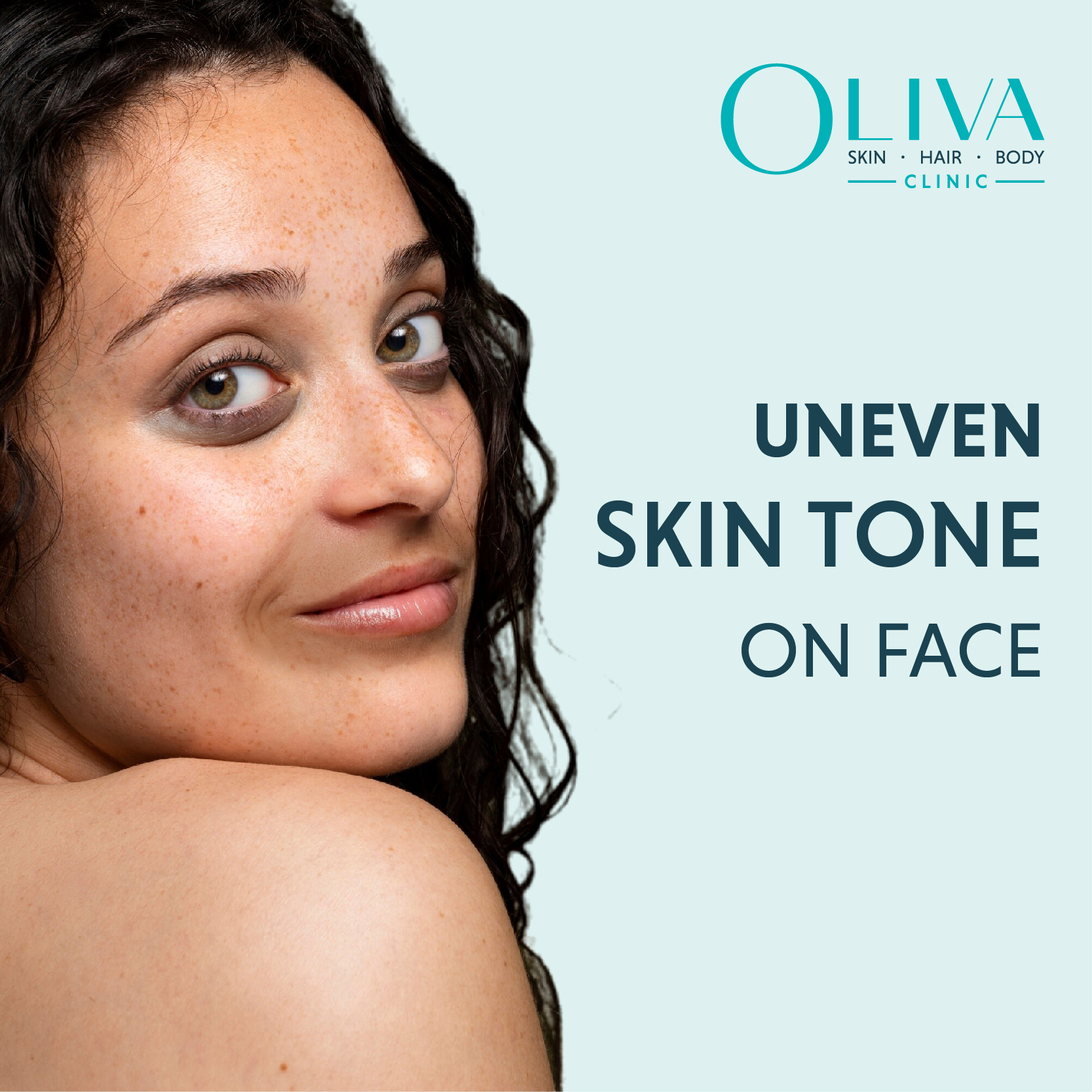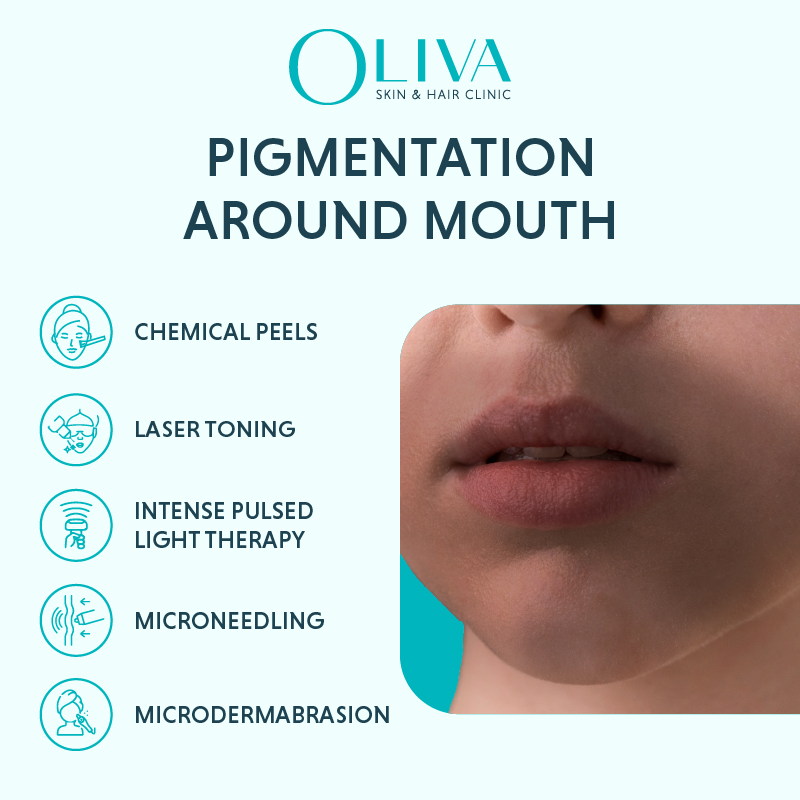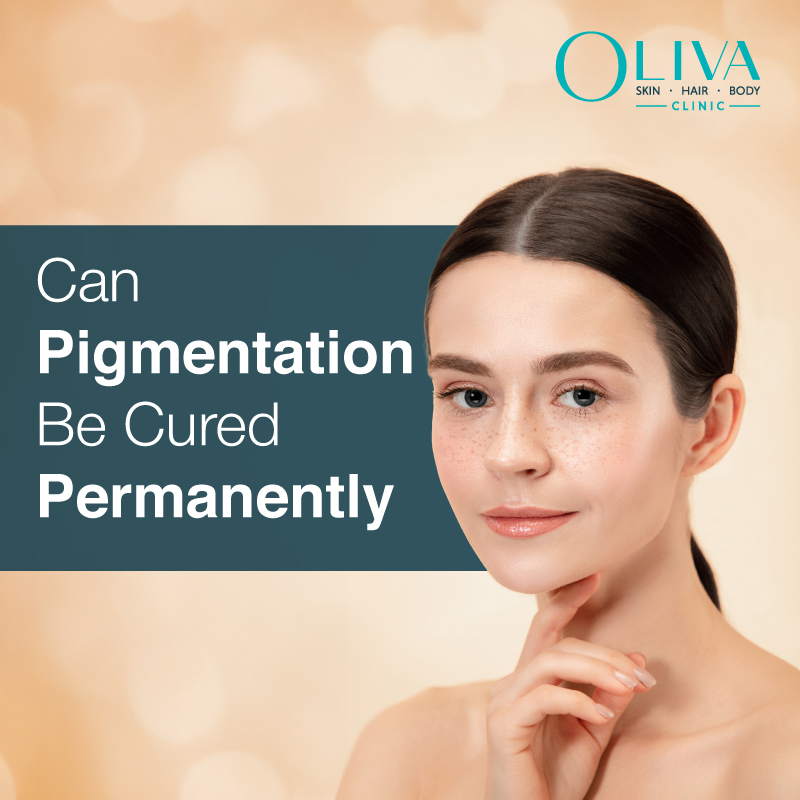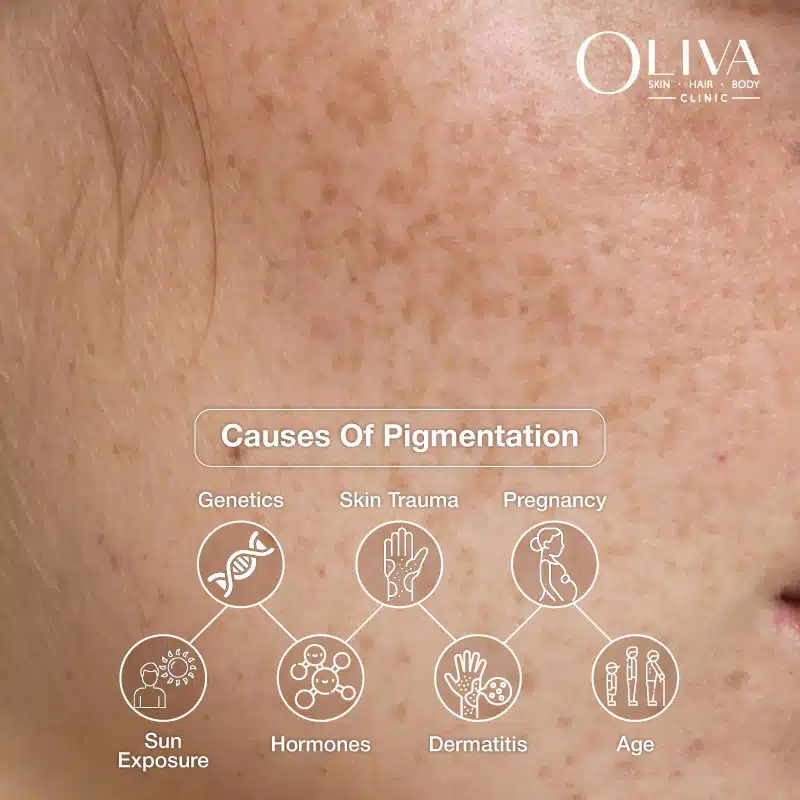In This Article
Uneven Skin Tone: Causes, Treatments, Home Remedies & Prevention
Patchy or uneven skin tone may signify hyperpigmentation. Learn about the causes and treatments for uneven skin tone.
In This Article

Facts About Uneven Skin Tone
Research indicated that 94% of the 14,584 people desired to improve their facial skin tone, and they used words like ‘radiant skin’, ‘healthy skin’ or ‘glowing skin’ to describe the required improvements in their appearance. [1]
The demand for laser treatments has considerably increased over the years, indicating that the need for advanced clinical procedures for healthy, clear and even-toned skin is gaining more traction and priority. [2]
Exposure to ultraviolet radiation activates melanin, which absorbs the harmful rays and leads to uneven skin tone. [3]
Furthermore, individuals with darker complexions are more prone to hyperpigmentation after sun exposure than those with lighter skin tones. [4]
What Does It Mean To Have An Uneven Skin Tone?
The phrase uneven skin tone describes skin pigmentation concerns such as tan, discolouration, melasma and post-inflammatory hyperpigmentation.
What Causes Uneven Skin Tone?
Multiple factors cause an uneven skin tone on the face and body. The most common ones include –
-
Sun Exposure:
Ultraviolet rays from the sun, especially UVA radiation, are a major trigger leading to hyperpigmentation and skin damage. These can easily penetrate the upper layer of the skin, break down the collagen, and cause pigmentary changes, leading to brown spots.
-
Pollution:
Various harmful pollutants in the air can penetrate the dermis and cause dark spots or patches.
-
Hormones:
Hormonal fluctuations experienced due to pregnancy or the use of birth control pills lead to increased melanin production and an uneven skin tone
-
Ageing:
In many older adults, age spots are common.
-
Genetic Factors:
Hereditary factors are also responsible for deciding the risk of hyperpigmentation. If one or both of your parents had uneven skin tone, it also makes you susceptible.
-
Post-Inflammatory Hyperpigmentation:
After acne clears up, one may experience post-inflammatory hyperpigmentation that causes brown or black acne marks on the skin.
-
Other Skin Conditions:
Any form of skin trauma, such as injury, insect bite, or burn, often causes uneven skin tone.
How To Get Rid Of Uneven Skin Tone?
If you are wondering how to remove uneven skin tone, then do not worry, as there is a plethora of treatment options. While home remedies and OTC products are the first line of treatments, they may provide temporary results or cause adverse reactions. It is best to consult a qualified dermatologist and seek an in-clinic treatment that may include chemical peels, micro-needling, microdermabrasion, IPL or laser toning based on the cause and severity of the pigmentation and the affected area.
Home Remedies For Uneven Skin Tone
The internet provides information on home remedies for uneven skin tone using readily available ingredients. Here are some of them:
Milk:
Rich in lactic acid, milk is a good nourishing agent for the skin. Using raw milk on the skin helps lighten spots and blemishes. With regular use, it helps to maintain glowing and clear skin. Take some milk in a bowl, dip a cotton ball in it and gently dab it on your skin. Rinse with water after 10-15 minutes.
Yoghurt And Honey:
Yoghurt contains probiotics and essential nutrients that help nourish and moisturise the skin. It is a rich source of lactic acid, an alpha-hydroxy acid (AHA), which helps dissolve dead cells and reveal radiant skin. Honey has antimicrobial properties and helps soothe any skin inflammation. A yoghurt honey mask can clear clogged pores and make your skin look fresh and glowing. Mix an equal quantity of honey and yoghurt and apply the mask on your face. Leave it for 20 mins, and then rinse it with a gentle cleanser.
Gram Flour:
Gram flour is a gentle exfoliator that helps remove dead skin. When mixed with milk and a pinch of turmeric, it eliminates excess oil and dirt accumulation and enhances the skin tone.
Multani Mitti:
This mask is rich in essential minerals that help cleanse and brighten the skin tone naturally. Multani mitti, or Fuller’s Earth, is also an excellent ingredient for absorbing excess oil from the skin and controlling acne flare-ups. Apply a thin Multani mitti mask to the face and rinse it properly when dry. Repeated use of this pack can help balance the skin’s pH level.
Baking Soda:
This kitchen ingredient has bleaching and anti-bacterial properties. It also acts as a good exfoliator for the skin. Mixing equal quantities of rose water with baking soda will gently exfoliate and cleanse the skin. You can avoid using baking soda directly on sensitive skin.
Sugar And Lemon:
You can make a homemade scrub by mixing lemon juice with sugar. This helps get rid of dead skin cells and achieve clear skin.
Tomato And Avocado:
Tomatoes are a great source of antioxidants and vitamins that prevent acne and reduce oil and dirt accumulation. Avocado promotes hydration and minimises skin damage from free radicals. Apply a paste of avocado and tomato and wash it after 25 minutes. Repeated use will help in enhancing your complexion.
Papaya:
Papaya contains an enzyme called papain, which is beneficial for overall skin repair and rejuvenation. It also has many antioxidants that help lighten the skin tone.
Sandalwood:
Sandalwood has been a popular home remedy for achieving glowing skin for ages. Various ancient Ayurveda texts describe its benefits and medicinal uses. It has anti-inflammatory, antiseptic, and astringent properties and works remarkably against many skin concerns, including skin irritation, pigmentation, and ageing.
Aloe Vera:
Aloe vera is a natural and excellent hydrating agent for the skin. Due to its anti-inflammatory properties, it helps reduce bacterial or fungal skin inflammations, thereby correcting the skin’s texture and tone. You can apply its gel directly onto the skin for an instant rejuvenating effect.
Disclaimer
Please note that the above ingredients mentioned here as home remedies do not have any research supporting their safety and efficacy. They may irritate your skin and cause further damage. Hence, use it as per your discretion.
OTC Products For Uneven Skin Tone
Here are some OTC products to treat an uneven skin tone that enjoy enormous popularity. These include –
Vitamin C:
Vitamin C is a powerful antioxidant that inhibits the production of melanin and helps brighten the complexion. It is an effective agent for treating hyperpigmentation, age spots and uneven skin tone. It is available in markets in a variety of forms, such as creams, serums and lotions.
Glycolic Acid:
Glycolic acid helps exfoliate the upper layer to remove dead skin cells and lighten the skin tone. It is an effective anti-ageing and skin-lightening agent that reverses photodamage. You can find glycolic acid in various OTC products, such as cleansers, moisturisers and serums.
Salicylic Acid:
Due to its exfoliating properties, salicylic acid helps unclog skin pores, get rid of trapped dirt and impurities, and reveal clear skin. It also helps reduce the appearance of scars, age spots, dark spots and wrinkles. It is often available in a 2% concentration in various OTC creams, masks and cleansers.
Retinol:
Retinol, a type of retinoid, acts as an anti-ageing agent by increasing cellular regeneration. This also helps reduce sun spots and achieve a brighter complexion. Various OTC products such as creams, gels, lotions, ointments and serums have a 2% concentration of retinol in them.
Niacinamide:
It is a type of vitamin B3 that helps reduce skin inflammation and promotes flawless skin tone. Niacinamide also promotes keratin production in the skin; keratin is the protein that helps revive and regenerate skin cells. Several skin-care OTC products with 5% niacinamide help reduce dark spots and promote even-toned skin.
Azelaic Acid:
This is a skin-care all-rounder with anti-bacterial, anti-inflammatory and skin-brightening properties. It is very helpful in reducing post-inflammatory hyperpigmentation. It is present in various OTC products, such as gels, creams and lotions.
Kojic Acid:
Kojic acid is naturally produced by fungi. It is an effective skin-lightening agent that inhibits the production of excess melanin. It is beneficial for fading dark spots, sun tan, age spots and melasma.
Hydroquinone:
Hydroquinone is a potent skin-bleaching agent that reduces melasma, hyperpigmentation, freckles and acne marks. It reduces the number of melanocytes in the body responsible for producing melanin.
Rosehip:
Rosehip oil is rich in skin-nourishing nutrients, such as Vitamins A, C, and E. Due to its anti-inflammatory properties, it reduces signs of ageing and pigmentation, promoting clear and radiant skin. It also helps to stimulate collagen production in the skin.
Nigella Sativa:
Extracted from black cumin, this helps reduce the production of excess melanin while treating hyperpigmentation.
Disclaimer
OTC products may give temporary results at best. The risk of recurrence is high as the root cause remains untreated. Unsupervised use of certain ingredients like retinol may cause skin discolouration.
Uneven Skin Tone Treatment By Dermatologists
Here is a list of some advanced uneven skin tone treatment options that show positive results when performed by experienced dermatologists:
Laser Toning:
As part of the laser toning treatment procedure, an experienced dermatologist will utilise a laser light of a specific wavelength to eliminate excessive build-up of melanin pigment in the skin. The dermatologist may use a specific type of laser (for example, Q-Switched Nd:YAG) depending on the skin concern and its severity. Different types of lasers have different penetrative capabilities. Some target superficial pigmentation, while others penetrate the deeper layers of the skin.
The treatment works on the principle of harnessing the power of light and heat energy to disintegrate melanin build-up in the skin. Once the melanin breaks down, our body’s immune system clears away the debris, revealing brighter and youthful skin. The dermatologist sets the parameters of the laser toning treatment according to an individual’s skin type and concerns.
This treatment is ideal for people with skin concerns like sun tan, melasma, age spots, and uneven skin tone. This treatment has several advantages, such as its unmatched safety, precision and zero downtime. The minor side effects of laser toning treatment include mild redness and temporary swelling in the target area, which subside within a few hours. Your dermatologist may recommend multiple sessions after assessing the severity of the skin pigmentation and the size of the target area.
Chemical Peels:
Chemical peels for uneven skin tone involve the application of a solution containing alpha-hydroxy acids extracted from natural sources on the affected area. These peels have exfoliation properties and encourage melanin breakdown by peeling away the damaged upper layers of the skin. Chemical peels are available in three concentrations: mild, moderate and deep. The choice of peel is the dermatologist’s discretion after analysing the depth and severity of pigmentation. It is an effective uneven skin tone treatment for the face that reduces tan, dark spots, melasma and acne marks. This treatment is safe and does not involve any major side effects other than redness and visible peeling for 5-7 days after the treatment.
Micro-needling:
Micro-needling involves using a device that gently pierces the dermis. This helps promote collagen production and naturally lightens the skin tone. This treatment may involve a prolonged downtime. For optimal results, most people require 3-5 sessions of the treatment over six months.
Microdermabrasion:
It is an in-office procedure in which the dermatologist uses an instrument (like a wand) to exfoliate the pigmented area. This treatment mainly targets the upper layer of the skin without triggering melanin breakdown. Therefore, the treatment is less effective in correcting uneven skin tone, but it is good for improving general skin health. It is a mildly abrasive treatment that aims to remove superficial pigmentation while promoting healthy skin. Typically, the dermatologist will recommend 4-6 sessions, but the number may vary depending on the concern and its severity.
IPL:
Intense Pulsed Light (IPL) therapy uses the principle of selective photothermolysis to break melanin pigment using the heat energy. This treatment is a more cost-friendly option than the laser treatment, however the results of laser toning treatment are far better than the IPL treatment. Depending on the severity of the concern, up to 12 sessions may be necessary.
How To Prevent Uneven Skin Tone?
As they say, prevention is better than cure. Here is a list of simple tips to avoid uneven skin tone in the first place –
-
Applying Sunscreen:
It is essential to use sunscreen with SPF 30 or above to protect one’s skin from the damage caused by UVA and UVB rays.
-
Exfoliate:
Regular exfoliation reduces the build-up of dead skin cells and helps maintain a healthy skin tone.
-
Refrain From Picking Your Skin:
If you have acne or pimples, avoid picking your skin to prevent dark spots or acne marks.
-
Avoid Sun Exposure:
Sun exposure is the biggest cause of uneven skin tone. Make sure to apply sunscreen and wear full sleeves, scarves and sunglasses while stepping outdoors.
-
Eat A Balanced Diet:
A balanced diet rich in antioxidants and essential nutrients help in detoxifying the skin and maintaining a heathy skin tone.
-
Use A Gentle Cleanser:
Ensure to cleanse your face using a mild cleanser to get rid of impurities, pollutants and dirt that may cause an uneven skin tone.
-
Do Not Forget To Moisturise:
After cleansing, moisturise your skin thoroughly to maintain the skin barrier.
-
Stay Hydrated:
Keep yourself hydrated by consuming water and fresh juices to detoxify your body and skin regularly.
-
Exercise Regularly:
Exercising is a great way to improve blood circulation to the skin.
-
Nourish Skin With Non-Comedogenic Oil:
Non-comedogenic oils do not clog pores and are helpful in nourishing the skin.
-
Consult A Dermatologist:
Consult a dermatologist if you notice a significant change in your skin tone, as it may be due to an underlying cause.
Takeaway
This article covered various treatment methods for uneven skin tone, from home remedies to OTC products and advanced cosmetic procedures. If you have been dealing with uneven skin tone for a long time and have tried several home remedies and OTC products and failed to see results, it is best to visit an experienced dermatologist. Seeing a qualified dermatologist will help diagnose any underlying cause and seek appropriate treatment.
Frequently Asked Questions On Uneven Skin Tone
Various factors can trigger uneven skin tone, including prolonged exposure to the sun’s UV rays, acne flare-ups, hormonal changes, ageing, genetics and skin conditions.
Uneven skin tone consists of dark spots, patches or discolouration that usually stands out compared to the rest of the skin.
Uneven skin tone can be permanent if left untreated.
Uneven skin tone results from hyperpigmentation or excess melanin production in the skin.
Uneven skin tone is one of the signs of dull skin.
Dark spots are one of the many pigmentary concerns that cause an uneven skin tone.
There is no research proving that Bio Oil works for uneven skin tone.
Castor oil may temporarily treat uneven skin tone, but there is a chance of recurrence as the root cause remains unaddressed.
Potatoes are organic bleaching agents that may temporarily help reduce uneven skin tone. However, uneven skin tone will recur if the root cause remains untreated.
The best treatment for uneven skin tone depends on the cause and severity of the condition, and only a qualified dermatologist can analyse and decide.
Consult a qualified dermatologist if you want to safely and effectively treat the uneven skin tone on your face.
Read This Next

Hyperpigmentation Around Mouth: Causes, Treatments & Prevention

Can Pigmentation Be Cured Permanently? Dermatologist’s Insights & Solutions

How to Remove Dark Spots Caused by Pimples: Dermatologist-Approved Solutions

Causes Of Pigmentation On Face: Treatments & Prevention Tips

Pigmentation Treatment Aftercare: Tips for Lasting Results & Faster Recovery



